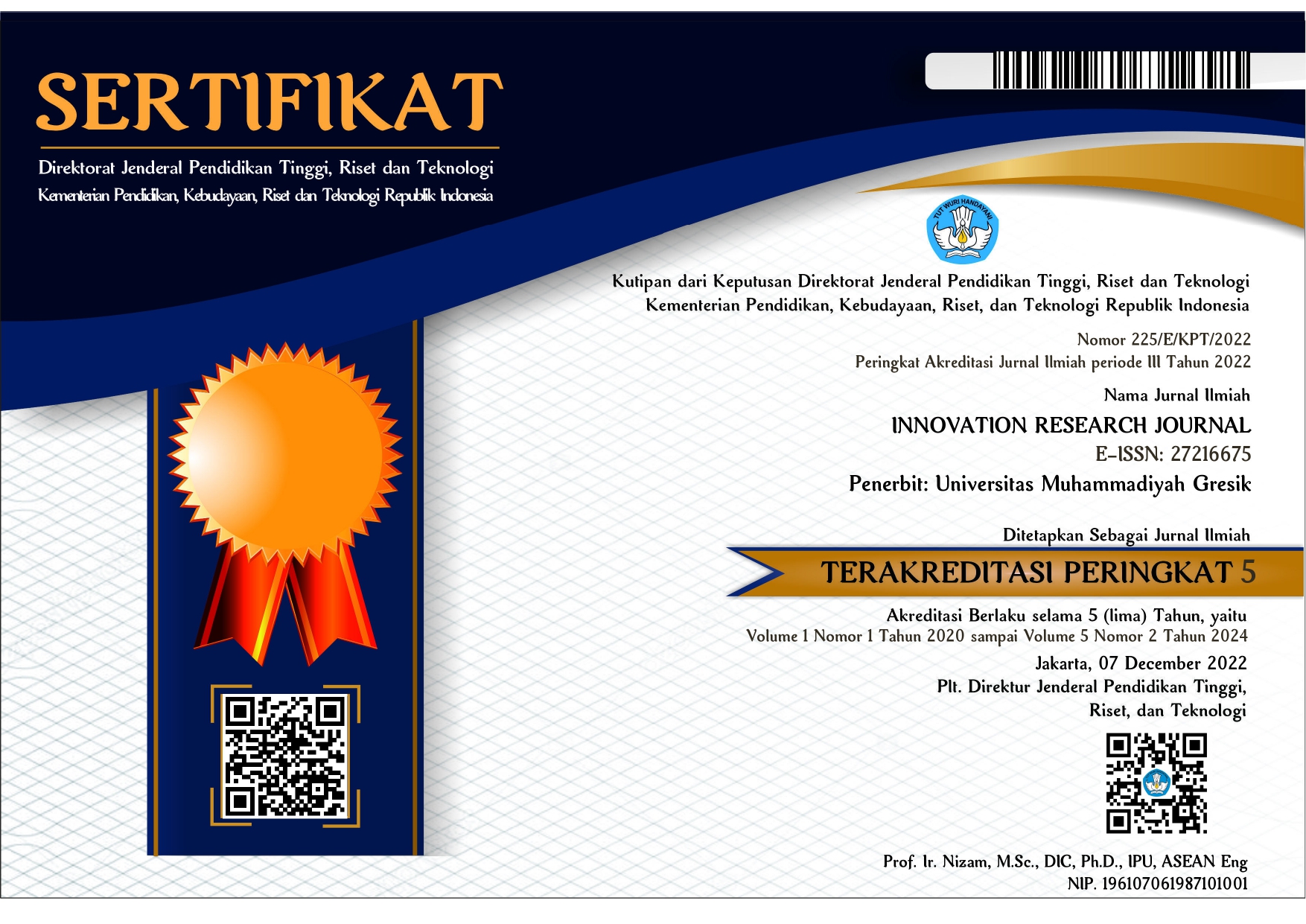Boosting Employee Performance: The Role of Commitment, Job Satisfaction and Engagement
DOI:
https://doi.org/10.30587/innovation.v6i1.8763Abstract
This study aims to analyze the influence of organizational commitment, job satisfaction, and employee engagement on employee performance at PT XYZ, an electronic cigarette company in Malang. This research is motivated by previous studies that have shown inconsistent findings regarding the influence of these three variables on employee performance. A quantitative approach with a saturated sampling technique involving 90 back-office employees was employed. Data were collected through questionnaires, and the validity and reliability were tested using SPSS 23.00. The Normality test, Heteroscedasticity, Multicollinearity, and Autocorrelation tests showed that the regression model had meet all classical assumptions. Meanwhile, data analysis using Regression analysis showed that simultaneously the three independent variables had a significant effect with a calculated F value of 32.504 and a significance of 0.000. Partially, organizational commitment, job satisfaction, and employee engagement each had a significant effect on employee performance with a significance value of 0% or below the tolerance value of 5%. Regression analysis showed that organizational commitment, job satisfaction, and employee engagement significantly influenced employee performance, both simultaneously and individually. The coefficient of determination (R²) of 0.739 indicates that 73.9% of the variation in employee performance is explained by these three variables, with organizational commitment being the most dominant variable. This study provides empirical evidence that organizational commitment, job satisfaction, and employee engagement are crucial and interrelated factors contributing to improved employee performance.
References
Allen and Meyer. (2013). The Measurement and Antecedents of Affective, Continuance and Normative Commitment to Organization. Jakarta: PT Elex Media Komputindo
Anoraga, P. (2019). Business Management. Semarang: PT.
Arikunto, S. (2020). Research Procedures: A Practical Approach. Jakarta: Rineka Cipta.
Astuti, D., and Suwandi, S. (2022). The effect od Employee Engagement on Employee Performace Mediated by Job Satisfaction. Eqien - Journal of Economics and Business, 11(04).
Azhari, Z., et al, (2021). The effect of job satisfaction on employee performance. ECONOMIC FORUM, 23 (2) 2021.
Basit et al. (2017). Impact of Leadership Style on Employee Performance (A Case Study on a Private Organization in Malaysia). International Journal of Accounting & Business Management. Vol.5 (No.2) November, 2017.
Baskara, L. and Sukiswo. (2015). The Influence of Leadership Style on Employee Performance at the Travellers Suite Hotel Medan. ILMAN, Vol. 3, No. 1, pp. 9- 15, February 2015.
Cascio, W.F. (2015). Managing Human Resources: Productivity, Quality of Work,. Life, Profits (10 th ed.). New York : McGraw Hill Higher Education.
Dessler. G. (2015). Human Resources Management, Fourteenth Edition, Indonesian. Jakarta: Indeks.
Dessler. G. (2015). Human Resources Management, Fourteenth Edition, Indonesian. Jakarta: Indeks.
Egenius, S., et al. (2020). The Effect of Job Satisfaction on Employee Performance Through Loyalty at Credit Union (CU) Corporation of East Kutai District, East Kalimantan. International Journal of Multicultural and Multireligious Understanding, Volume 7, Issue 10 October, 2020.
Fauziek, E. and Yanuar. (2021). The Influence of Job Satisfaction on Employee Performance with Job Stress as a Mediating Variable. Journal of Managerial and Entrepreneurship, Volume III No. 3/2021.
Gede, IK and Piartini, PS (2018). The Influence of Leadership on Employee Performance Moderated by Work Motivation at BPRs in Sukawati Gianyar District. E-Journal of Economics and Business, Udayana University 7.4 (2018): 1107-1134, 2019.
Ghozali, I. (2021). Multivariate Analysis Application with IBM SPSS 26 Program. 10th Edition. Diponegoro University Publishing Agency.
Gibson, JL, et al. (2015). Organization and Management: Behavior, Structure, and Process, translated by Joerban Wahid. Jakarta: Erlangga.
Gibson. (2015). Human Resource Management. Jakarta: Erlangga.
Ginanjar, H. and Berliana. (2020). The Influence of Organizational Commitment on Employee Performance at PT. Sinar Citra Abadi in Jakarta. Journal of Effective Economics, Vol. 3, No. 4, July 2021.
Gomes, F. (2018). Human Resource Management (Translated Edition). Yogyakarta: Andi Offset.
Greenberg and Baron. (2018). Behavior in Organizations, Understanding and Managing The Human Side of Work. Massachusetts : Allinand Bacon, A Division of Schuster.
Handoko, H. (2020). Human Resource Management. Jakarta: PT.
Hasibuan. (2021). Human Resource Management. Revised Edition, Thirteenth Printing. Jakarta: Bumi Aksara.
Hendrayana, IGNB, et al, (2021). The Influence of Job Satisfaction on Employee Performance Mediated by Organizational Commitment. Widya Amrita: Journal of Management, Entrepreneurship and Tourism, November 2021, Vol. 1 (No. 4).
Julindrastuti, D. and Karyadi, D. (2023). Organizational Commitment as a Mediating Variable in the Effect of Job Satisfaction on Employee Performance. Equilibrium: Journal of Economics-Management-Accounting Volume 19, Number 1, April 2023.
Kasmir. (2016). Human Resource Management (Theory and Practice). Depok: PT. Rajagrafindo Persada.
Kreitner, R. and Kinicki, A. (2016). Organizational Behavior, Translated by: Erly Suandy. Jakarta: Salemba Empat.
Kristian, BW and Ferijani, A. (2020). The Effect of Job Satisfaction and Organizational Commitment on Employee Performance with OCB as the Intervening Variables (A Case Study on PT. Ulam Tiba Halim Distributor Company). Journal Of Management and Business Environment, Vol.2 (1) July 2020.
Mangkunegara, AAAP (2018). Corporate Human Resource Management. Bandung: Remaja Rosdakarya. Moenir, (2015). Public Service Management in Indonesia. Jakarta: PT Bumi Aksara.
Mathis and Jackson. (2019). Human Resource Management. Jakarta: Salemba Empat.
Nasution, MI (2018). The Influence of Job Stress, Job Satisfaction and Organizational Commitment on Turnover Intention of Medical Representative. Scientific Journal of Management, Volume VII, No. 3.
Nitisemito. (2019). Human Resource Management. Third Edition. Jakarta: Ghalia. Indonesia.
Notoatmodjo, S. (2018). Human Resource Development. Jakarta: Rineka Cipta.









